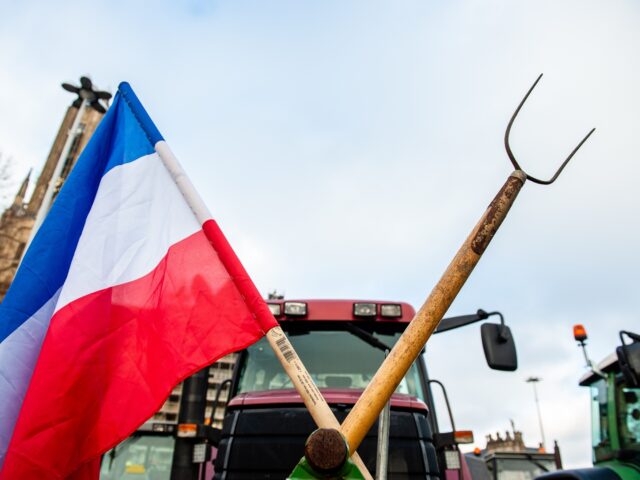The Dutch pro-farmer populist party has set out a vision of self-determination for the people of the Netherlands, arguing in its election manifesto that the country should have the right to “opt-out” of European Union agreements on the climate and mass migration.
Firmly planting its flag on the populist right of Dutch politics, the Farmer-Citizen Movement (BoerBurgerBeweging, BBB) has called for a radical overhaul of the current asylum system, which it has argued has left villages throughout the Netherlands being “terrorised” by so-called refugees.
The BBB party also noted the strains put on the housing market, saying: “Newcomers to our country should no longer be given priority for housing. It is inexplicable that a 30-year-old Dutch person cannot get a house, but someone who just comes here immediately gets a house.”
The party not only called for a hard cap of 15,000 asylum seekers per year but also called for the EU to adopt a similar scheme proposed by the UK, to send those applying for refuge to countries in Africa such as Tanzania, Malawi, Namibia or Senegal. It also criticised Brussels for failing to secure its external borders and for not deporting those who have no right to remain in Europe.
“Asylum seekers who have no right to stay in the Netherlands must return as soon as possible their country of origin. BBB is committed to good relations with the countries where these nationals reside have to go back to. Where countries really do not cooperate, there should be financial consequences.”
Perhaps most importantly, the populist party argued that Europe as a whole needs to develop an “African Strategy” to deal with the large influxes of economic migrants, which BBB said will likely only increase as the population of the continent is set for massive growth this century.
Drawing upon its roots as a pro-farmer organisation, the BBB argued that the Netherlands, which is home to some of the most productive agricultural systems in the world, could help teach African nations to develop the “intensive agriculture and livestock farming” methods that they will require to feed their populations and therefore reduce the number of people fleeing the continent out of poverty.
Battle for the Great Reset: EU Green Agenda Architect to Face Off Against Farmer Movement in Dutch Elections https://t.co/vgS0frmTGZ
— Breitbart London (@BreitbartLondon) August 25, 2023
Elsewhere in its election manifesto, the Farmer-Citizen Movement declared that it will seek to end the “suffocating” nitrogen regulations inspired by the EU green agenda.
The outgoing government of Prime Minister Mark Rutte argued that it would be necessary to cut nitrogen emissions from livestock farms in half by the year 2030 in order to satisfy the EU’s Natura 2000 scheme, which mandates EU member-states to remove industry or farming from areas determined to be ecologically significant.
Rutte’s government, which fell earlier this year over a dispute on immigration policy, said that up to 30 per cent of all livestock farms may need to be shut down for good. To accomplish this, the globalist-minded government introduced a farmer buyout programme, which although initially will be voluntary, could become mandatory, with up to 3,000 farms facing permanent shut-down.
The BBB, which was born out of the tractor protest movement against the green agenda measures, argued that the EU Natura scheme is too disparate in its impact, and that instead of small areas of protection spread out across the country, larger areas should be designated, to not only increase efficiency in being able to protect such lands but also to reduce the impact on farmers and businesses.
The party also called for the EU to invest in manure-based fertilisers rather than just seeking to eliminate artificial nitrogen fertilisers without a suitable replacement. Finally, the party called for the bloc to establish “food protected areas”, arguing that food insecurity is already a growing problem throughout Europe and some areas should be protected in order to provide a base of food production.
The Netherlands, despite its relatively small size, is one of the largest food producers in the EU, with the LTO national farming lobbying group estimating that 94.5 billion euros in food were exported from the country in 2019. The restrictions on livestock farms threaten the country’s status as the largest exporter of meat in Europe and the fifth-largest dairy exporter in the world.
Although the Farmer–Citizen Movement (BBB) swept to victory in the Senate and local elections earlier this year — becoming the largest party in the country after previously holding zero seats — it is unlikely that they or indeed any single party will secure enough votes to win an outright governing majority. However, the party stands a good chance of entering government on a coalition basis from which it would have a large influence over government policy.
Dutch Farmer Party Picks Anti-Vax Pass Crusader as Prime Minister Candidatehttps://t.co/Pb7Ae2Q09p
— Breitbart London (@BreitbartLondon) September 3, 2023

COMMENTS
Please let us know if you're having issues with commenting.